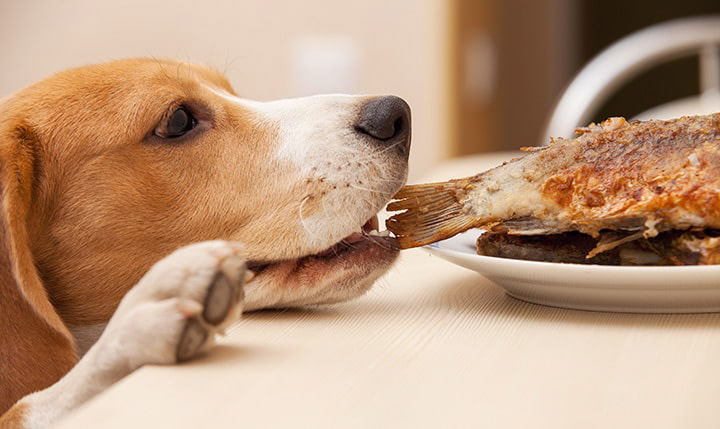Is your dog’s breath leaving you gasping for air? Learn the common causes of fishy dog breath and discover how to cure it naturally with simple home remedies!

Understanding Dog Breath: Normal vs. Abnormal
Dogs are not known for having minty fresh breath, but that doesn’t mean it should smell foul or fishy. A mild doggy odor is normal and expected, especially after they eat or drink. However, if your dog’s breath smells like fish, something is wrong and needs your attention.
Fishy breath is a sign of an underlying health issue that could be serious or even life-threatening. It could indicate a problem with your dog’s teeth, gums, digestive system, or other organs. Ignoring it could lead to more complications and discomfort for your furry friend.
That’s why it’s important to investigate the cause of your dog’s fishy breath and seek veterinary advice as soon as possible. In this article, we’ll explore the possible causes of fishy dog breath and how to treat and prevent it effectively.
Common Causes of Fishy Dog Breath
There are many possible reasons why your dog’s breath smells like fish, but here are some of the most common ones:
Dental Issues
One of the most likely causes of fishy dog breath is poor dental hygiene. Plaque and tartar buildup on your dog’s teeth can harbor bacteria that cause bad breath and gum disease. If left untreated, this can lead to gingivitis and periodontal disease, which can damage the teeth and gums and cause infections.
Another possible dental issue that can cause fishy breath is an infected tooth or an abscessed gum. This can result from a broken tooth, a foreign object stuck in the mouth, or a severe case of gum disease. An infection can cause pus, swelling, pain, and a foul odor in your dog’s mouth.
Digestive Problems
Another common cause of fishy dog breath is a problem with your dog’s digestive system. This could be due to dietary indiscretion, which means your dog ate something they shouldn’t have, such as garbage, spoiled food, or feces. This can upset their stomach and cause vomiting, diarrhea, and bad breath.
Another digestive problem that can cause fishy breath is food allergies or intolerances. Some dogs may be allergic or sensitive to certain ingredients in their food, such as grains, dairy, or meat. This can cause inflammation, itching, and irritation in their mouth, skin, and gut, as well as bad breath.
Other more serious digestive problems that can cause fishy breath include liver or kidney disease, diabetes, or pancreatitis. These conditions can affect your dog’s metabolism and cause toxins to build up in their blood and urine. This can result in a fishy or ammonia-like odor in their breath, as well as other symptoms such as weight loss, increased thirst, and lethargy.
Other Causes
There are some other less common causes of fishy dog breath that are worth mentioning. One of them is dehydration, which can cause your dog’s mouth to dry out and become more prone to bacterial growth and bad breath. Another one is upper respiratory infections, which can cause nasal discharge, sneezing, and coughing, as well as bad breath.
A rare but possible cause of fishy breath is a tumor or a mass in your dog’s mouth or digestive tract. This can interfere with your dog’s normal chewing and swallowing and cause bleeding, ulceration, and infection. This can also produce a fishy or metallic odor in your dog’s breath, as well as difficulty eating and breathing.

Diagnosing the Cause of Fishy Breath
As you can see, there are many possible causes of fishy dog breath, and some of them are more serious than others. That’s why it’s crucial to consult your veterinarian for a proper diagnosis and treatment plan. Your vet will examine your dog’s mouth and teeth, and may perform some diagnostic tests, such as blood tests, urine tests, x-rays, or ultrasounds, to rule out any underlying conditions.
Depending on the cause of your dog’s fishy breath, your vet will prescribe the appropriate treatment and medication. For example, if your dog has dental issues, your vet may recommend a professional dental cleaning, tooth extraction, or antibiotics. If your dog has digestive problems, your vet may suggest a dietary change, probiotics, or anti-inflammatory drugs. If your dog has a tumor or a mass, your vet may advise surgery, chemotherapy, or radiation therapy.
Treatment Options for Fishy Breath
While veterinary care is essential for diagnosing and treating the cause of your dog’s fishy breath, there are also some things you can do at home to help your dog feel better and improve their breath. Here are some home care tips for fishy dog breath:
Dental Hygiene
One of the best ways to prevent and treat fishy dog breath is to maintain good dental hygiene for your dog. This means brushing your dog’s teeth regularly, at least once a day, with a soft-bristled toothbrush and a dog-friendly toothpaste. This will help remove plaque and tartar, prevent gum disease, and keep your dog’s breath fresh.
You can also provide your dog with dental chew toys, treats, or water additives that can help clean their teeth and reduce bad breath. However, these are not a substitute for brushing, and you should always check the ingredients and safety of these products before giving them to your dog.
Dietary Changes
Another way to improve your dog’s breath is to make sure they are eating a balanced and nutritious diet that is suitable for their age and health. Avoid giving your dog any human food, especially spicy, greasy, or sugary foods, that can upset their stomach and cause bad breath. Also, avoid giving your dog any bones, rawhide, or other hard objects that can damage their teeth and gums and cause infections.
Instead, feed your dog a high-quality dog food that is free of artificial colors, flavors, or preservatives, and that contains natural ingredients that can support their dental and digestive health. For example, some dog foods contain probiotics, prebiotics, or enzymes that can help balance your dog’s gut flora and reduce bad breath. You can also add some fresh fruits and vegetables, such as apples, carrots, or parsley, to your dog’s diet, as they can help clean their teeth and freshen their breath.
Veterinary Treatments
If your dog’s fishy breath is caused by a serious condition that requires veterinary intervention, you should follow your vet’s instructions and give your dog the prescribed medication or treatment. For example, if your dog has an infection, you should give them antibiotics as directed by your vet. If your dog has a dental problem, you should take them for regular dental checkups and cleanings. If your dog has a tumor or a mass, you should monitor their condition and follow up with your vet.

Preventing Fishy Breath in Dogs
The best way to deal with fishy dog breath is to prevent it from happening in the first place. Here are some preventive measures you can take to keep your dog’s breath fresh and healthy:
- Regular dental care: Brush your dog’s teeth daily, provide them with dental chews or treats, and take them for regular dental checkups and cleanings.
- Balanced diet: Feed your dog a high-quality dog food that is appropriate for their age and health, and avoid giving them any human food or bones that can harm their teeth or stomach.
- Prompt veterinary attention: If you notice any signs of fishy breath or any other health problems in your dog, take them to the vet as soon as possible for diagnosis and treatment.
Conclusion: Keeping Your Dog’s Breath Fresh & Healthy
Fishy dog breath is not something you should ignore or tolerate. It is a symptom of an underlying health issue that could be serious or even life-threatening. By following the tips in this article, you can find out the cause of your dog’s fishy breath and treat it effectively. You can also prevent it from happening again by taking good care of your dog’s dental and digestive health.
Your dog deserves to have a fresh and healthy breath that reflects their overall well-being. By addressing fishy breath promptly and properly, you can improve your dog’s quality of life and enjoy more cuddles and kisses with your furry friend!
